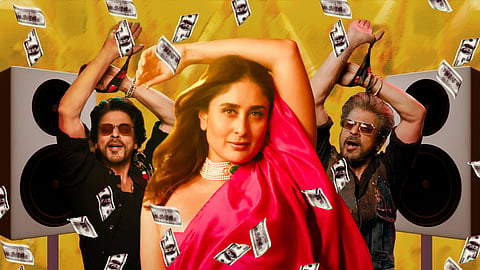
- Reviews
- Power List 2024
- Cannes 2024
- In-Depth Stories
- Web Stories
- News
- FC Lists
- Interviews
- Features
- FC SpecialsFC Specials

Recently singer Ila Arun grumbled about the remix of her songs “Ghagra” and “Choli Ke Peeche”, which featured in the hit film, Crew (2024). In an interview with India Today, Arun said she learned of the remix minutes before the launch of the new song. The remixes would go viral and while there were many online comments that criticised the new versions, the songs also became popular. If these remixes are working for a new audience, they’re also proving to be a windfall for the music companies that own the rights to the originals.
Screenwriter and lyricist Mayur Puri said, “The older songs — especially all the contracts before 2012 (before The Copyright Amendment Act, 2012) — the rights of the song are owned by the music label. They are the owners of these songs. They can sell it to anyone they want.” Licensing old songs is big business for the labels that have been around since the Nineties. An artist and writer, requesting anonymity, said, "When you have few powerful players in any market, it tends to become a syndication, a cartel. That is what’s happening in the Indian music industry – it is a cartel."
Someone who has worked in the music licensing business said on condition of anonymity said, “It (licensing) starts at Rs. 20-25 lakhs and it can go all the way up to Rs. 75 lakhs depending on the song. Sometimes it can be over Rs. 1 crore.” Another film industry insider said that music labels often try to “squeeze out” the maximum amount of money from those requesting rights. “If I'm making a film with Shah Rukh Khan, the price becomes different. If I'm making this film with Ayushmann Khurrana, the price is different. It's like how a vegetable vendor sees your clothes and tells you the price of the bhindi (okra).”
For Puri, the larger concern is that the licensing business uses the work of creators without giving them their financial due. “They (the music label) can do whatever the hell they want with it without actually paying the original creators,” said Puri. “It's not a problem, legally speaking. We can't do anything about it. But ethically there’s a problem, right? Especially the writers, composers, and artists, people who created the older songs, they feel cheated.”
When it comes to remixes, the legality and process of distributing royalties are more complicated. “Consider the 2018 song “Dilbar” from Satyameva Jayate (2018),” said Puri. “Now the original song was Sameer (Sameer Anjaan) saab's song from Sirf Tum (1999). It has been re-done by Tanishk Bagchi for this new film. Originally it was Nadeem-Shravan’s composition. The rights are with T-Series. Now when it is remixed, the new people who have added things to the original song — Shabbir Ahmed and Ikka have written extra lyrics, and Bagchi has added some new beats — will also get a share of the pie.”
In terms of the distribution of royalties, the label gets 50% of the royalties, and the other half is divided equally between the composer and the lyricist. “The rights of the old song remain the same but for the new song the royalty gets equitably distributed between all the creators,” said Puri. “Nadeem-Shravan and Tanishk Bagchi will get 25%, so that’s 12.5%-12.5% for them. And even with the lyrics, Sameer saab will get 12.5% and Shabbir Ahmed and Ikka will get 12.5%.” Puri’s contention is that the original creators deserve a greater percentage than those who opt to “piggyback on the success of the old one” by remixing it.
Incidentally, singers and performers don’t get a share of the royalties but by remaking the song, the music label gets 50% royalties to the new song too. An industry insider who requested anonymity said, “What happens is that these music companies are not very transparent. They don't tell everybody how much money they are making, and it is a lot.” Since there are only a few key players in the Indian music market — Saregama, Tips, Universal Music, T-Series, Shemaroo, Sony Music, etc — their catalogues are vast. A source close to one of the music labels said, “Saregama and T-Series have such extensive catalogues that if they stop making new music today, they will still be the biggest music companies in the country purely by using their old catalogue. It is a goldmine. A gift that keeps giving.”